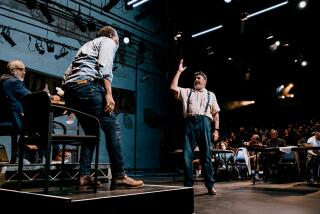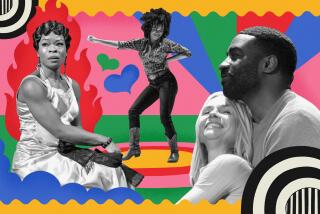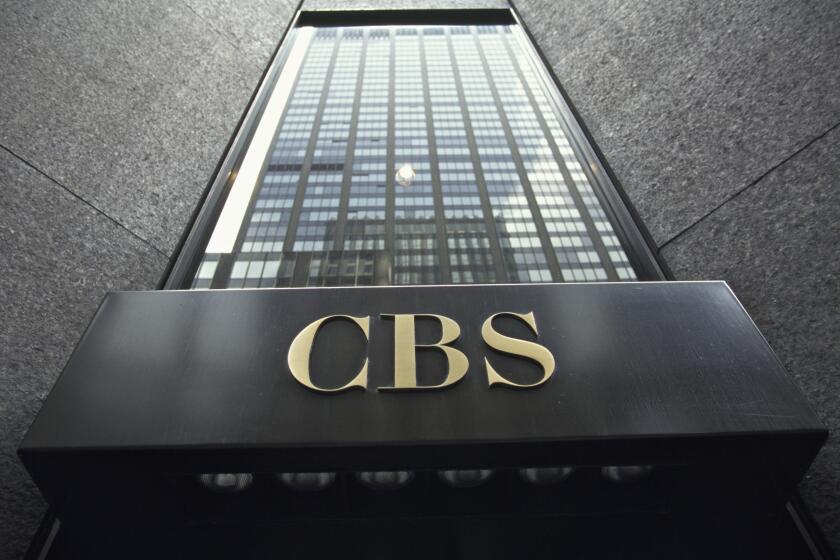We’re Still Inheriting the Wind : Robards, Douglas Head TV Cast
- Share via
The producers of a new TV production of “Inherit the Wind,” set in 1925, thought they had found just the right school in Oregon to use as a location for a scene about a teacher accused of the crime of teaching evolution.
Before they could shoot, however, someone connected with the school, a Catholic institution in Medford, discovered the theme of the production. Permission was withdrawn, the producers were told, because “we don’t teach that here.”
“Inherit the Wind” seems perennially timely.
“If anything, today the issues are more strongly drawn,” says Kirk Douglas, who stars with Jason Robards in the NBC movie, airing Sunday at 9 p.m. “The reason we’re doing the play again is that the problem is even bigger now, when someone like Pat Robertson can run for President.”
The original 1955 play lightly fictionalized the 1925 prosecution of teacher John Scopes for breaking the Tennessee law against teaching evolution (a law not repealed until 1967). In 1988, science and fundamentalist religious beliefs still clash in the widespread dispute over whether biology textbooks should give Creation Science equal weight with the theory of evolution.
The drama revolves around the confrontation of a traditionalist and a freethinker. As the traditionalist, Douglas plays a character modeled on famed orator and three-time Democratic Party presidential nominee William Jennings Bryan. Bryan appeared for the prosecution in the Scopes trial, which became known as the “monkey trial.” Robards plays a lawyer modeled on liberal defense attorney Clarence Darrow.
“Inherit the Wind” remains controversial because it attacks head-on and in detail the view that the account of Creation in the book of Genesis is literally true. Many religious people accept scientists’ contradiction of Genesis, but fundamentalists do not.
Today, while some fundamentalists still fight against the teaching of evolution, many instead advocate equal space in biology textbooks for Creation Science, which a relatively small number of scientists endorse as a theory having as much validity as Charles Darwin’s. The tables are thus turned: In 1925 the fundamentalists wanted to ban Darwinism; now liberals seek to stop Creation Science. In the most recent case, a Tennessee appeals court last August upheld a school’s right to use texts omitting fundamentalists’ views.
Robards sees the play as a plea for open-mindedness: “It’s about the right to think. You should have a right to choose.
“You shouldn’t ever ban books,” he says. “You should have a choice. Some people believe Genesis was right; others don’t. It all goes round and round. I feel you’ve got to believe in something bigger than yourself. It can’t just be me, me, me.”
Douglas says: “In my opinion, religion has nothing to do with going to school. As a matter of fact, the Constitution orders a division of religion and government. The Bible account of creation is a beautiful allegory. The Garden of Eden, the tree of knowledge, the six days--that’s an allegory, not science.
“Obviously,” he adds, “I don’t share the beliefs of the character I’m playing. That’s why I’m an actor and they pay me all this money--to play characters.”
In the play, the Darrow character is depicted as the voice of cool reason, the Bryan character as a half-crazy bumbler.
However, Douglas’ interpretation should elicit more sympathy for the character, if not for his beliefs.
“I thought things were a little too stacked against my character,” Douglas explains. “He comes off as a buffoon, a bit of a pompous ass. But just like Pat Robertson and Jimmy Swaggart, the man believed in what he was saying. He wasn’t a phony. Bryan ran for President three times, and Darrow supported him the first time. I see this as the tragedy of a man of stature who became extremely religious and fell from a great height.
“You should be rooting for Darrow, but I don’t believe Bryan should be caricatured, as Fredric March did (in the motion picture). He doesn’t have to be a glutton on top of everything else.”
Robards approached his part more as a trouper, less as a concerned citizen. “I read the script (by John Gay), and that’s what I’m playing.”
The two stars were playing to a packed courtroom full of extras in ‘20s garb on a sound stage in Hollywood. Under the eye of four-time Emmy Award-winning director David Greene, they were rehearsing one of the production’s final scenes. Robards watched from the defense table as Douglas, still wearing his peach-colored dressing gown, was led from the witness stand dementedly reciting the names of the books of the Bible.
“Inherit the Wind” is an intensely histrionic vehicle that has attracted many top actors over the years. In the original Broadway production, which ran for more than 800 performances, Paul Muni and Ed Begley created the roles based on Darrow and Bryan, and Tony Randall played a part modeled on journalist H. L. Mencken.
In Stanley Kramer’s 1960 film, Spencer Tracy, Fredric March and Gene Kelly played the three roles; Tracy received an Oscar nomination. A “Hallmark Hall of Fame” TV production in 1965 starred Melvyn Douglas, Begley and Murray Hamilton.
The current TV production includes Darren McGavin in the Mencken-esque part and Jean Simmons in a beefed-up-for-TV role as Douglas’ supportive wife.
When this production was first discussed in 1985, executive producer Peter Douglas and his father, Kirk, sought Gregory Peck for the Darrow-like role.
“Greg and I discussed it,” Douglas senior confirms. “We had a lot of talks. We’ve often talked over the years about doing something together. In this case, Greg wanted to do the play in its original form, and I didn’t. I was more interested in taking a different point of view.”
At one point during the two years that the Douglases worked on developing the new version, the elder Douglas wanted the original playwrights, Jerome Lawrence and Robert E. Lee, to update the story. “Originally, we had a version written in the present,” he says. “Oddly enough, it didn’t work. Paradoxically, the story seems more modern set in 1925.”
Robards retains vivid memories of the play’s original Broadway production. “I saw Muni, and then I saw it again with (Melvyn) Douglas, who took over from Muni on two weeks’ notice when Muni needed eye surgery. I had a lot of friends in the cast playing small parts. They passed the word around to come see (Melvyn) Douglas in a run-through. There were a few hundred of us--wonderful stuff.”
Stage actor that he insists he remains, Robards jokingly notes that he must beware of chewing the scenery too much for the small screen.
“I just hope I’m not getting too melodramatic. Yesterday I was grilling Kirk on the witness stand so hard that my dentures almost fell out. I almost broke the lens on the camera with my teeth. I’ve got to keep telling myself not to be hammy. Bring it down, stop projecting so much--with TV, there’s no balcony.”
More to Read
The complete guide to home viewing
Get Screen Gab for everything about the TV shows and streaming movies everyone’s talking about.
You may occasionally receive promotional content from the Los Angeles Times.






